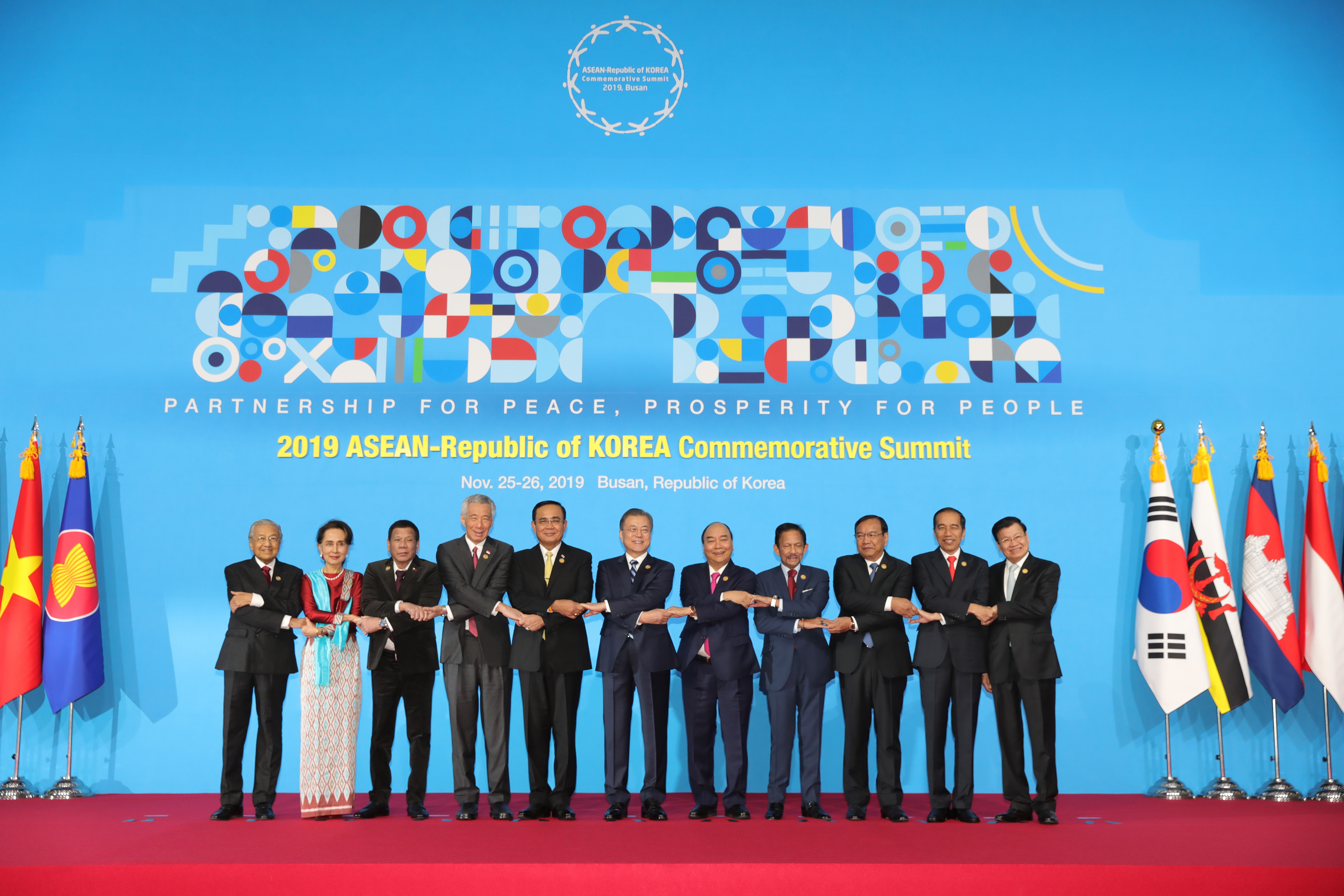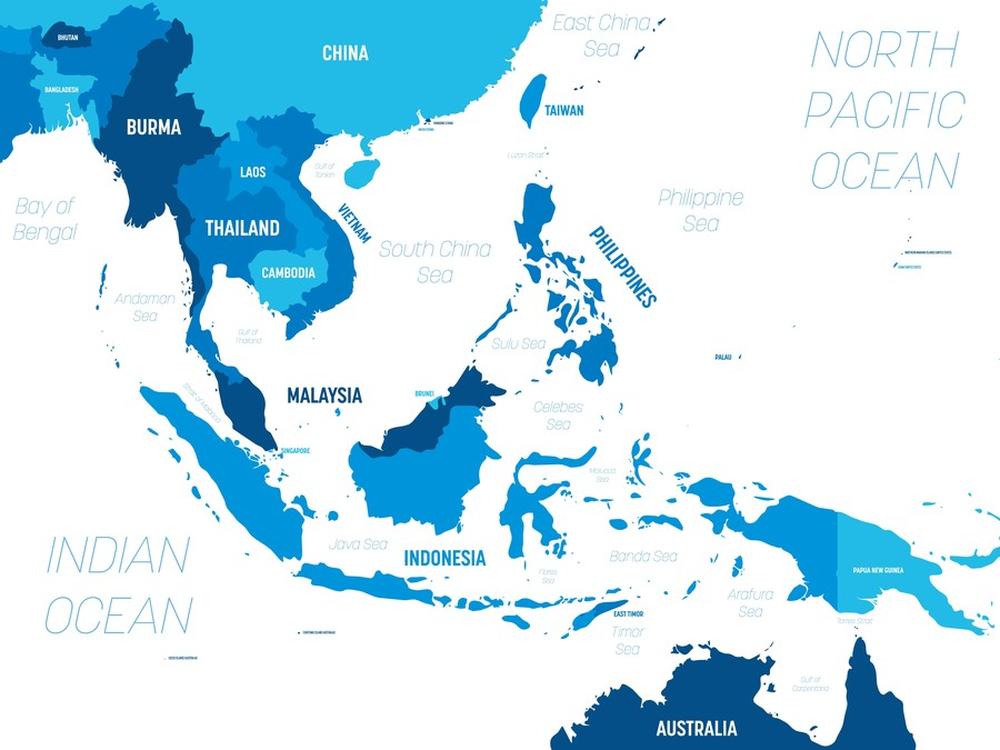- #Yoon Administration
- #ASEAN
- #Alliance
- #South Korea

► The Yoon administration aims to establish a mutually beneficial ROK-ASEAN relationship not only by enhancing cooperation in a reciprocal and pragmatic manner, but also by supporting the norms- and rules-based order through expanding multilateral and minilateral networks.
► The new ROK administration may bolster the momentum generated so far in ROK-ASEAN cooperation to further improve relations with ASEAN and also strengthen the ROK-US comprehensive strategic alliance.
Upon taking office on May 10, the Yoon Suk Yeol government declared its key foreign policy objective to develop the ROK-US alliance into a global comprehensive strategic alliance that can address various new forms of challenges, including climate change and economic security. At the same time, the Yoon administration aims to establish a mutually beneficial ROK-ASEAN relationship not only by enhancing cooperation in a reciprocal and pragmatic manner but also by supporting the norms- and rules-based order through expanding multilateral and minilateral networks. This is a continuation of past efforts to strengthen ROK-ASEAN cooperation and reflects the Yoon administration’s strategic objective to play a more constructive role in stabilizing the regional security order, which was missing in the past. As such, the new ROK administration may bolster the momentum generated so far in ROK-ASEAN cooperation to further improve relations with ASEAN and also strengthen the ROK-US comprehensive strategic alliance.
Expectations Surrounding ROK’s Active Role in the Region
When the Moon Jae-in administration took office, it implemented the so-called New Southern Policy in order to strengthen ROK’s relationship with ASEAN. In reality, ASEAN had doubts about the policy’s consistency and continuity, especially during the early phases. However, as President Moon paid visits to all 10 ASEAN nations, hosted the ROK-ASEAN Special Summit in 2019, and provided COVID-19 related assistance to ASEAN, Korea’s image within ASEAN has clearly improved. Despite these accomplishments, however, Korea became the target of criticism because of its lack of tangible commitments to address regional diplomatic and security issues, especially involving strategic issues. The Yoon administration maintains that it will abandon Korea’s cautious and ambiguous position of the past and take on a more confident approach to diplomatic and security issues in the Indo-Pacific. It contains that it will assume a more active role in the region—a role that is in sync with international expectations. This stance is expected to raise ASEAN’s expectations about ROK’s new approach to diplomacy.
First, it is expected that Korea’s newly inaugurated government will be more actively engaged in security issues in the region, even when dealing with sensitive security agendas such as the South China Sea issue. This is something that ASEAN has wanted from Korea in the past. Korea’s New Southern Policy enjoyed somewhat of a success in terms of improving relations with ASEAN. However, it received criticisms for focusing too much on economic issues while lacking policy initiatives on strategic and security issues. ASEAN does not currently see Korea as a preferred and trusted strategic partner in part because of its strategic ambiguity in addressing security issues that are central to ASEAN’s concerns, including the South China Sea issue (See the 2022 ISEAS Survey Report[i]).
Park Jin, the new ROK foreign minister, recently said during his confirmation hearing that Korea should take a more active role and stressed that Korea would work with the US to defend the rules-based order in the Indo-Pacific, making an active contribution to freedom of navigation and overflight in the South China Sea[ii]. ASEAN countries would want nothing more than for Korea to make a clear and active position on the South China Sea issue during the ASEAN-ROK summit meeting in November this year.
Second, ASEAN expects a positive impact from the Yoon government’s effort to improve relations with Japan. For ASEAN, both Korea and Japan are important economic and strategic partners. Although strained ROK-Japan relations have not directly influenced ROK-ASEAN relations, ASEAN believes that ROK-Japan cooperation will provide a synergy effect and help its relationships with the two countries.
Third, ASEAN expects the new ROK government to become a reliable and trustworthy economic and security partner to ASEAN amid intensifying US-China rivalry. In today’s Indo-Pacific region, growing China’s assertiveness and US-led minilateral groupings against China such as the QUAD and AUKUS are marginalizing the ASEAN-led multilateral platforms and challenging ASEAN’s central role in the region. From ASEAN’s perspective, US economic engagement with ASEAN has been relatively insignificant compared to China’s intensive one over the past decade. Moreover, President Joe Biden following former President Donald Trump has been lukewarm to multilateral trade strategy so far[iii]. This has altered the economic balance of power in Southeast Asia. As a result, ASEAN faces a difficult situation in which it must seek cooperation with responsible middle powers like Korea. Therefore, ASEAN looks forward to stepping up economic cooperation with South Korea, including trade, investment, and development cooperation in the Mekong Subregion.
Challenges to ROK’s Cooperation with ASEAN
While ASEAN has high hopes for Yoon’s government, it also has concerns. First and foremost, ASEAN’s trust in Korea has risen and most ASEAN members would like to continue to develop their partnerships with Korea, which have been strengthened over the past few years. However, their longstanding concern lies in Korea’s lack of policy consistency and continuity towards ASEAN from government to government[iv]. Will Korea’s new administration inherit its ASEAN policy from its predecessor? Will it continue to enhance cooperation with ASEAN amidst growing instability on and around the Korean Peninsula? Moreover, there are lingering questions whether the Yoon administration will keep its promise to conduct foreign policy in a confident manner and play a more active role in addressing security issues, such as freedom of navigation in the South China Sea and other issues that China may react sensitively to. Fortunately, President Yoon’s campaign pledge for a strategy dubbed the “ROK-ASEAN ABCD (Advance human capital, Build health security, Connect cultures, and Digitalize Asian infrastructure)” shares similar objectives with the New South Policy[v]. At the end of the day, President Yoon, especially early on in his presidency, will have to deliver a consistent message conveying his willingness to keep the ROK-ASEAN partnership as one of his foreign policy priorities.
The Way Forward
The intensification of the US-China strategic rivalry and geopolitical tensions in the Indo-Pacific will doubtless provide an opportunity to expand the space for cooperation between ASEAN and Korea. In this regard, ASEAN has strong desires to work with the ROK government for improving regional peace and prosperity and explore ways to produce tangible results of cooperation. These include a broad range of issues including climate change, infrastructure, maritime security, water security, digital economy, and pandemics. The Biden administration is also pursuing its ASEAN policy within its broader Indo-Pacific Strategy and the Indo-Pacific Economic Framework (IPEF). This implies that Korea and ASEAN will have greater opportunities to strengthen cooperation on infrastructure, supply chain, green technology, and advanced technology. Given the United States’ goal to step up its engagement with ASEAN, increasing cooperation between ASEAN and Korea will also help shore up the US-South Korea alliance. Several important global summit meetings involving ASEAN members are scheduled for the latter half of this year. Cambodia will hold ASEAN-related summit meetings and the East Asia Summit, Indonesia is scheduled to host the G20 Summit, and the APEC summit meeting will take place in Thailand. The new government of ROK needs to take advantage of these multilateral forums to articulate its ASEAN policy and showcase Korea’s willingness to engage with ASEAN.
[i] The State of Southeast Asia: 2022 Survey Report (ASEAN Studies Centre, ISEAS Yusok Ishak Institute, 2022), https://www.iseas.edu.sg/articles-commentaries/state-of-southeast-asia-survey/the-state-of-southeast-asia-2022-survey-report/.
[ii] Ji Da-gyum, “S. Korea should stand firm on security issues against China: FM nominee,” The Korea Herald, May 1, 2022., http://www.koreaherald.com/view.php?ud=20220501000184.
[iii]Bilahari Kausikan, “Threading the Needle in Southeast Asia,” Foreign Affairs, May 11, 2022., https://www.foreignaffairs.com/articles/southeast-asia/2022-05-11/threading-needle-southeast-asia?check_logged_in=1.
[iv] Joanne Lin, “ASEAN’s Relevance for the New South Korean Administration,” Fulcrum: Analysis on Southeast Asia, May 20, 2022., https://fulcrum.sg/aseans-relevance-for-the-new-south-korean-administration/.
[v] Scott Snyder, “South Korean President-Elect Yoon Suk Yeol’s Early Foreign Policy Challenges,” Forbes, March 24, 2022., https://www.forbes.com/sites/scottasnyder/2022/03/24/south-korean-president-elect-yoon-suk-yeols-early-foreign-policy-challenges/?sh=4735579c656d.
Dr. Cho, Wondeuk is currently a research professor of the Center of ASEAN-Indian Studies at the Institute of Foreign Affairs and National Security (IFANS), Korea National Diplomatic Academy (KNDA). He is also a visiting professor teaching ASEAN and Oceania courses at Yonsei University. His main research topics consist of international relations of the Indo-Pacific region-esp. the Mekong Subregion and South Asia including India, and US policy in the Indo-Pacific. His academic articles were published in Defence and Peace Economics, Pacific Focus, and other Korean international relations journals including National Strategy, Journal of Northeast Asia Research, Korean Political Science Review, etc.
